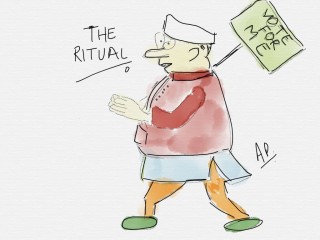By Divya Sharma
If we want avoid ritualism in elections, we will have to see that the voter’s engagement with democracy does not end once his vote is cast. How can we make democracy more than a fifty-yearly voting ritual? Are there ways to improve our democratic system as if the voter mattered? How can we ensure greater functional content in ‘of’ and ‘by’ the people, so that democratic governance also becomes more manifestly ‘for’ the people?
There are ways and ways of avoiding the ritualistic aspect of elections.
Some suggest that the country should make voting compulsory. In case the voters are not satisfied by all the contestants, they could be offered ‘none of the above candidates’ option. Can we justify in voting? Yes, say those who advocate compulsory voting. Their arguments are simple. When a citizen enjoys the rights and freedoms in a democracy, he also has duties to perform, one of them being the duty to vote. When voting becomes compulsory, voters are more likely to become aware of their right to ask questions of their elected representatives, political parties and members of government. The others of course have their reasons why voting must not be compulsory and democracy and democracy should respect choice or even non-choice. Once compulsion sets in there are likely to be consequences and the state can turn into authoritarianism.
Secondly, could there be an institutional way for elected representatives, candidates and leaders of political parties to mandatorily listen to voters? Today most of the communication is one way: leaders give speeches, but rarely listen to what the people only voice their personal grievances when they get an opportunity to talk to their MP’s, LA’s or political leaders. They do have views and concerns to share about the larger issues facing the country. Many of them have creative solutions to offer. After all, common citizens care as much about the nation as, if not more than, the leaders who hog the limelight. Sadly, their voices go unheard because all political parties are more or less impervious to accepting ideas from ordinary citizens, much less making them participants in governance. Institutionalization of this two-way dialogue is a matter that needs wider debate.
Shouldn’t the people have right to recall if their representatives are not fulfilling their functions? While the term of the legislature could be of five years, the term of the legislators could be as long as people have trust in them. If large numbers of people in the constituency are dissatisfied with functioning of the representatives, they should have the right to recall candidate so that people are recognized as their servants, called to serve the community. If the linkage is established of the representatives, the system is likely to be less ritualistic.
The representatives of the people should have regular sessions of interaction with his constituency. An MLA or an MP should compulsorily respond to every representation coming for voters in his constituency. They are primarily their representatives and they should listen to their representations. Elected representatives should be asked to present an annual report detailing his or her activities in legislatures, legislature committees, constituency and spending under the MPLADS (Member of Parliament local area Development Fund) or MLA fund with some kind of social audit. The representatives also should submit an account of their increased assets at these sessions so that they are not involved in making use of politics to accumulate wealth through dubious ways.
To be heard, it is necessary for voters to be organized. In some places of Mumbai, Delhi and Bangalore, for example, the Resident Welfare Associations (RWAs) have powerful grassroots groupings, which deal not only with neighborhood issues but, at the time of assembly or parliamentary elections, also as platforms for ordinary citizens to talk to candidates and campaigners. We need more such autonomous, non-political platforms that mobilize common people’s opinion.
When it comes to nurturing the interaction between voters and their elected representatives, a huge disappointment is the functioning of the media. As the fourth pillar of democracy, the press enjoys enormous freedom, prestige, power, which are of course in due. Sadly, covering of parliamentary news by the big media has pl alarmingly over the years. Next only voters but even Ps feels that they have no place in the media. Lok Sabha TV, in its present format, is a poor substitute to what the larger media can and should do. Clearly, owners and editors of privately owned media would do well to introspect if they are doing enough to promote vox populi (voice of the people). Fifth, we now have a powerful new medium in the internet to empower the voters. It can do what the traditional print and TV media are either loath to do or cannot do – give people a medium that they can ‘own’. Internet is indeed the greatest tool of democratic empowerment in human history. We in India need to devise ways of using it effectively to let the people speak truth to power.


































